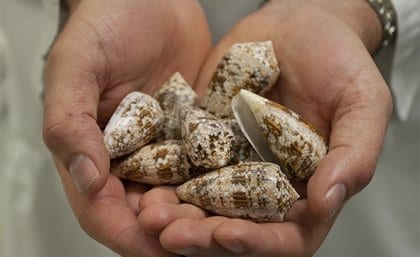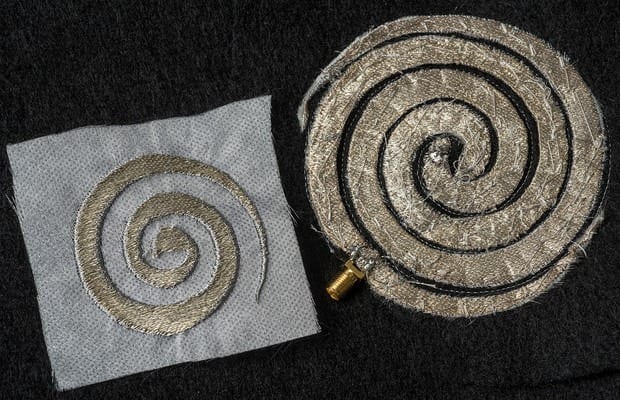
A University of Queensland researcher has made a big step toward the holy grail of biomedical science — a new form of effective pain relief.
School of Biomedical Sciences researcher Dr Richard Clark said marine snail venom was a well-known and promising source of new pain drugs, but substantial hurdles had restrained progress.
“Translating the venom’s toxins into a viable drug has proved difficult,” Dr Clark said.
“But now we’ve been able to identify a core component of one of these conotoxins (toxins from cone snail venom) during laboratory tests.
“We think this will make it much easier to translate the active ingredient into a useful drug.”
Dr Clark said a sea snail used its venom to immobilise prey and protect itself.
“The venom’s analgesic properties have been well researched,” he said.
“In this study, we’ve been able to shrink a particular conotoxin to its minimum necessary components for the pain relief properties to continue to work.
“Using a laboratory rat model, we used the modified conotoxin to successfully treat pain generated in the colon, similar to that experienced by humans with irritable bowel syndrome.
“Although the conotoxin has been modified, its pain relief properties remained as effective as the full-size model.
“Simplifying the conotoxin will make a drug much faster and cheaper to develop.”
Dr Clark said further research was under way to improve the modified conotoxin’s stability and to test its ability to treat other types of pain.
Learn more: Pain drug in pipeline as researchers unwind marine snail puzzle
The Latest on: Pain relief
[google_news title=”” keyword=”pain relief” num_posts=”10″ blurb_length=”0″ show_thumb=”left”]
via Google News
The Latest on: Pain relief
- ‘Don’t give up hope’: FIT Physical Therapy promotes healing for life with chronic pain programon April 27, 2024 at 8:03 am
Did you know that over 50 million people nationwide (about 20% of adults) suffer from chronic pain? America has a pain crisis, and it’s only getting worse. Enter the skilled and caring experts at FIT ...
- Mattresses for back pain — up to $2,600 off my top 7 picks from this weekend's saleson April 27, 2024 at 5:30 am
7. Awara Natural Hybrid Mattress: was from $1,299 | $649 at Awara Sleep Created using natural latex, our Awara Natural Hybrid Mattress review found this bed has a subtle contouring and strong support ...
- Opinion: Elon Musk gives Wall Street what it wants, but more pain could be around the corneron April 27, 2024 at 3:42 am
When asked for any details about the new model by a Wall Street analyst, Musk was terse, saying he had said all he was going to say on the new vehicle. He later tried to focus more attention on the ...
- Scientists Make Breakthrough in Chronic Pain Treatmenton April 26, 2024 at 7:53 am
Scientists have developed tiny robotic nerve "cuffs" to diagnose and treat neurological disorders. The flexible devices offer a safer, minimally invasive alternative to today's diagnostics and could ...
- Ovulation Pain and Relief Optionson April 26, 2024 at 6:55 am
Ovulation pain is mild discomfort mid-cycle. Severe pain from ovulation affects your quality of life. Learn what helps with this pain.
- Painful Truth Campaign encourages non-opioid solutions for pain reliefon April 25, 2024 at 11:21 am
The United States makes up around 4% of the world's population, but it consumes more than 80% of the world's opioids.
- Novaa Lab Reviews – Does It Work For Pain Relief or Fake Red Light Therapy Product?on April 25, 2024 at 1:31 am
NovaaLab stands as a beacon of hope for those seeking natural and effective solutions for pain relief and accelerated recovery. Founded by a visionary biohacker, NovaaLab has pioneered the use of red ...
- MVH uses nitrous oxide to bring patients quick pain reliefon April 24, 2024 at 10:39 am
As part of a federal spending bill recently signed by President Joe Biden, Massachusetts Sens. Elizabeth Warren and Ed Markey helped secure much-needed funds for Martha’ Hospital. The federal money ...
- Wellnee Pain Relief Patch Reviews (2024): Scam or Legit?on April 22, 2024 at 9:27 am
On a regular Saturday morning, I was getting ready for my weekly basketball game, something I always looked forward to. But as I got ready and took some practice shots, a sudden pain shot through my ...
- Vertex’s stock climbs as non-opioid pain treatment advanceson April 18, 2024 at 5:59 am
Vertex Pharmaceuticals shares gained ground early Thursday after the company signaled progress in the development of its experimental non-opioid pain treatment.
via Bing News










